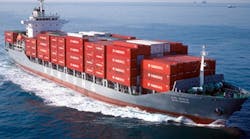New technologies are targeting a variety of logistics services, including automated scheduling, the consolidation of deliveries from multiple shippers, on-demand trucking and carrier-based data analytics, according to a PwC survey, "Transportation and logistics trends 2019".
A recent report from FreightWaves, a T&L data provider, said that in the first three quarters of 2018, venture investment in the industry was larger than in all previous years combined and more than double the 2017 record of $1.4 billion.
The threat of new competitors is a one of the reasons that in PwC's report on CEOs, T&L chief executives’ confidence in their own organization’s revenue growth over the next 12 months is at a five-year low, with only 29% stating they are ‘very confident.’ In 2017, 45% were safely in the confident camp.
This lack of optimism has led established T&L companies to scout around for fresh revenue streams that are at times only tangential to their core business, the report concluded. It used the example of Germany’s Deutsche Post DHL which opened a second factory for its manufacturing subsidiary, StreetScooter, which was originally set up to manufacture DHL’s fleet of electric delivery vans. This new plant is slated to double StreetScooter’s annual production to 20,000 vehicles with an eye towards sales to other logistics companies.
"But the flurry of digital activity has reached such a tipping point that T&L companies cannot afford to ignore the potential impact of new technologies, nor can they put off determining how they can digitally transform their business models," the report states. "The T&L sector may have been slow to change in the past, but the startups, apps and venture capital swirling around make it clear that for the logistics segment, at least, this is no longer the case. Incumbent companies, large and small, that fail to keep pace may find themselves in an industry they don’t recognize in a few years."
One of the advantages of partnerships with startups is the ability to recruit talent that will be able to devise how to use advanced technology in both operations and services. Finding skilled talent was a concern voiced by survey respondents. Fifty-five percent said they were ‘extremely concerned’ that this skills gap does not allow them to innovate, 53% said that it is causing them to miss their growth targets, and 49% said that it is preventing them from pursuing a market opportunity.
Using New Technologies for Competitive Edge
The report suggests that using technologies such as artificial intelligence (AI) can help companies distinguish themselves from the competition, provide better service, cut costs and enhance day-to-day operations. For instance, fleet management could be greatly improved by the use of sensors inside trucks, ships and airplanes connected to AI programs that monitor fuel consumption and recommend ways to minimize oil and gas usage, as well as programs that suggest proactive maintenance activities before expensive and time-wasting major breakdowns occur.
PwC cited truck manufacturers such as Daimler and Isuzu who have invested heavily and effectively moved into the logistics business by upgrading their vehicles with advanced cameras, sensors and software to automatically identify, scan and record packages as they are loaded.
In addition, these programs will suggest where items should be placed according to size, destination, weight and impact on fuel expenditures. Just a small step from these machine-based capabilities would be autonomous equipment that continually assesses and adjusts climate control systems in unique quadrants of the truck cargo area according to the requirements of different shipments. This would greatly expand a logistics company’s market for special handling shipments, such as perishable food items, pharmaceuticals and chemicals.
And for scheduling, AI can tap networks of fleet sensors to forecast demand and optimally organize shipments while guaranteeing precise delivery times. This opens up the possibility of dynamic pricing. Just as travel companies adjust prices based on demand, seeking to generate the highest possible return for each ticket, so too could T&L companies charge more from one moment to the next on the basis of pickup, shipment and delivery volume in a circumscribed area. To do this, T&L companies would have to implement AI programs that can accurately measure supply and demand in snapshots of time rather than solely through a long view.
Despite the promise of technology, T&L CEOs are cautious about spending money on "expensive programs when their margins are crimped." In PwC’s CEO Survey, 40% of T&L respondents said they had no plans to pursue any AI projects, compared with only 23% of CEOs from all major industries.
The general reluctance of the industry to quickly adopt new technology need to be changed according to PwC. "To survive in the midst of so much new competition and new technology simultaneously hitting the logistics segment of the transport and logistics industry, executives must be prepared to adopt new strategies more than they have been in recent years. Everything—including how operations are structured and managed, the way digital technologies are adapted for creative uses and approaches, and how the workforce is hired and deployed—is rife with change. The T&L business is generally not known for its technological agility or its propensity for rapid reinvention. Companies today shouldn’t grow too comfortable with that old familiar way of doing business."



